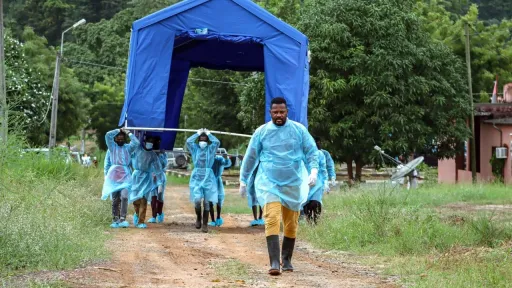When three-year-old Jacques collapsed from a bout of severe dehydration caused by cholera sometime last year, a newly installed oral rehydration point in the Kipushi health zone of southeastern Democratic Republic of Congo (DRC) saved his life.
The simple intervention – part of a World Health Organisation (WHO) initiative – represents a growing network of life-saving measures transforming Africa's response to one of its oldest scourges.
"One day he was playing, the next he was unable to stand," his mother Marie Kabange, 32, recounts to TRT Afrika. "The diarrhoea was so bad – water was pouring out of him. I carried him on foot to the nearest clinic, praying he would survive."
Jacques's quick recovery is a measure of the success African healthcare systems have achieved by focusing on basic, timely steps in the battle against cholera. And all this amid a global surge in the incidence of this potentially fatal diarrhoeal disease caused by contaminated water.
Over 40 countries reported outbreaks last year alone, continuing a trend that resumed in 2021. Various studies peg the number of cholera cases at 1.3 to 4 million annually, with up to 143,000 deaths.
WHO warns that a billion people are at direct risk of contracting cholera, with endemicity being the highest in areas riddled with poverty, poor sanitation and climate-related disasters.
Regional bulwarks
"Cholera isn't just a health crisis; it's a symptom of inequality," says Dr Philippe Barboza, WHO's team lead for cholera and epidemic diarrhoeal diseases. "Where clean water is scarce and sanitation systems fail, cholera follows."
In sub-Saharan Africa, where recent outbreaks have tested the fragile healthcare systems, the focus is now on tackling the root cause of the problem. A $392,000-project backed by WHO in the Haut-Katanga region of the DRC has significantly reduced cholera risks.
The initiative entails training health workers, installing rehydration points and setting up treatment centres.
"Before, we had nothing – no bleach, no way to purify water," Alain Mutombo, a nurse in Haut-Katanga, tells TRT Afrika. "Now, we produce chlorine, which helps protect entire villages."

Vaccination campaigns
Angola has mobilised rapid response teams, launched a vaccination campaign and started water-source mapping – supported by WHO and UNICEF – to combat the disease. Since January this year, the Central African country has reported 14,000 cases and 505 deaths, with half of these patients being under 20.
"We treated every water point we could find," says Teresa Domingos, a healthcare official in Luanda. "But floods keep coming, and people are still drinking from dirty streams."
In Sudan, where flooding and unhygienic conditions in displacement camps have fuelled an explosion of 51,300 cholera cases and 1,359 deaths since August 2024, healthcare authorities are trying to ramp up vaccination. The campaign has reached 7.4 million people so far.
Neighbouring South Sudan has achieved over 90% vaccination coverage in high-risk areas, immunising more than 910,000 people.
"Vaccines help, but these alone won't work," says Magok Deng, a physician in Juba. "Without clean water, cholera will keep returning."
Testing and treatment
Zimbabwe's response to the outbreak, which began in 2023, demonstrates the effectiveness of capacity-building efforts. Cholera testing has increased 371% since WHO trained nearly 1,000 nurses in rapid diagnostics.
"Samples used to take weeks to process. Now, we know the results in hours," Tinashe Moyo, a lab technician in Harare, tells TRT Afrika.

Experts believe that sustainable solutions necessitate ongoing investment in clean water sources and sanitation.
"Cholera is preventable," says Dr Barboza. "But until everyone has clean water, outbreaks will keep happening."
As climate change and conflict worsen water insecurity, the global battle against cholera is getting intense. For those like Marie, who feared losing her toddler son to cholera, the fight has become a personal mission.
"I tell my neighbours: boil your water, wash your hands," she says. "This sickness took too many lives. We can't let it win."



















